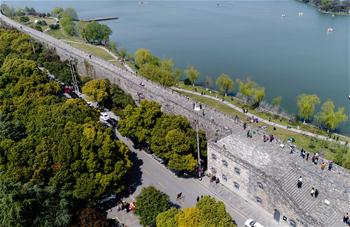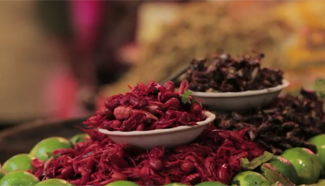GUANGZHOU, March 29 (Xinhua) -- For millennia farmers have relied on manpower to plow the fields and scatter the good seed on the land. However, as many rural residents left their hometowns to work in the city, it has become harder to recruit and retain farmhands.
For one farming collective in south China's Guangdong Province, however, a lack of man -- or woman -- power is no longer a problem.
The collective, in the township of Xi'an in Lianzhou City, established a hire company in 2016, which rents out agricultural equipment to its members.
One person to benefit from the collective's rental company is He Guozhan.
After six years of being a migrant worker, He noticed that farming incomes had increased, and so he decided to move back to the land of his fathers to seek his fortune.
"In the past, my family could only manage half a hectare of paddy, but now I manage over three hectares of arable land all by myself," he said.
The collective decided the rental fee for equipment should be based on the size of land the machine will work. Thus, a flat fee of 5,700 yuan (827 U.S. dollars) per hectare was decided upon. This has helped the farmers make much higher profits from their products. He said that since the hire company was established his net profits per hectare of paddy had risen from around 5,000 yuan to 9,000 yuan.
"As machines now do the majority of the hard work, I just focus on the watering and fertilizing," he said.
Chen Honghui manages the hire company. He explained that all the equipment was either purchased with profits from the rent or loaned to the collective by its members.
The hire company now rents out equipment to over 20 villages across the township.
"Equipment sharing means that farmers can grow more produce despite limited manpower, this has helped to increase their incomes," said He Yongfeng, deputy Party head of the township.
Not far away in Yangshan County of Qingyuan City, Chen Youzhi recently became a company shareholder.
Supported by the local government, he was one of 86 low-income families in the county to apply for a soft loan of 10,000 yuan in 2016, which they used to buy a stake in Haoran Agriculture Produce Co., a leading enterprise in the region.
The cash injection enabled the company to open a chicken farm, which can raise 160,000 chickens a year, while Chen and all the other investors receive dividends at year end.
"Besides dividends, we can also work at the company or receive free training," Chen said.
To help locals with loans, the government allocated 100,000 yuan to each village to help in cases of defaults.
"By enlisting farmers as shareholders, villagers have a regular income," said Pan Zhiwei, head of the local poverty relief office.
Other collectives have started similar programs to boost farmer's incomes.
"I received a 5,000-yuan bonus last year in addition to the 40,000 yuan I made from selling my produce," Zhou said.
In the past, despite his hard work, Zhou Shixing from Yangshan County found it hard to turn a profit from his 0.23 hectare plot of land.
"One time, a few villagers and I rented a car so we could take our vegetables to a market in Guangzhou, but we still did not make any profit. I was so out of pocket that I did not even have enough money to buy seeds for the next year," he told Xinhua.
In 2015, Zhou and 150 of his fellow farmers joined a cooperative, which helps manage 567 hectares of land. The cooperative buys produce from its members, and at the end of the year pays a bonus to each farmer based on the profits the collective makes from selling the produce.
"The cooperative bought my eggplants for 1.6 yuan per kilo in the second half of 2016, of which I take home 0.60 yuan for every kilo. Later, my produce sold for up to 3 yuan a kilo in Dongguan City, and I was given a bonus based on the higher margins," said Zhou.
Last year, more than 2,000 households received at least 5,000 yuan through this system. People, like Zhou, are now more confident than ever that they will soon shake off poverty.












